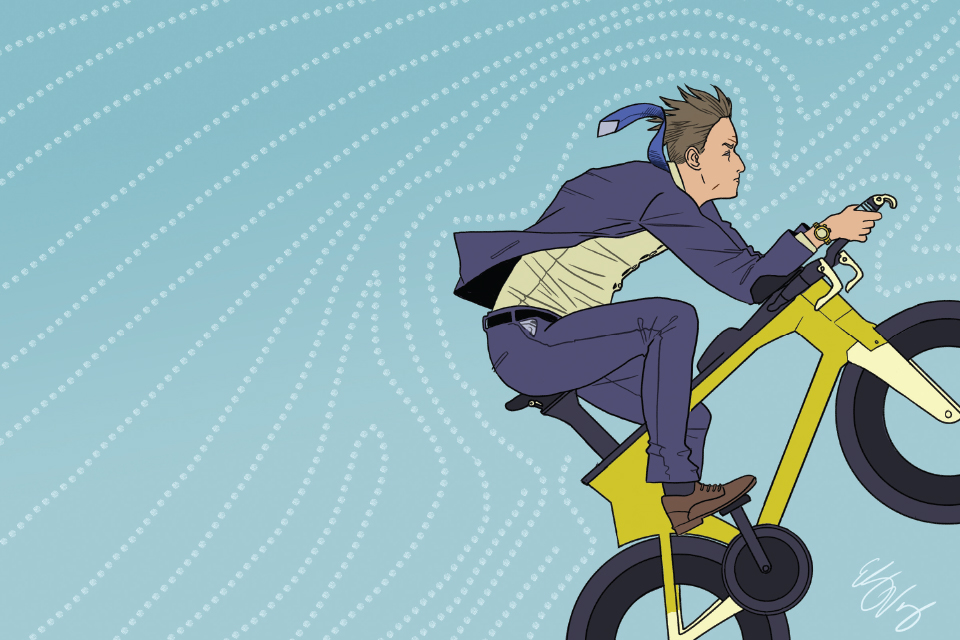7 Career Lessons I Learned on My Bike

Riding a bike has been compared to life, most famously by Albert Einstein in a letter to his son Eduard. To paraphrase, Einstein told his son that people are like bicycles: you can keep your balance by moving forward. I have found this to be true, among other lessons I have learned from cycling.
Facing Headwinds
Facing headwinds is expected in cycling and in your career. It is easy to point out and even exaggerate the headwinds from stubborn bosses to inefficient processes. The challenge is to appreciate the tailwinds and take on headwinds to build grade-A grit. You can not change the weather, but you can change your attitude toward it.
Riding in a Pack
Riding in a large group is a skill. The pace is often set by the leader, communication is critical in pointing out debris in the road, and you ride within inches of other’s wheels. There are leaders that wait at each turn for others to catch up and leaders that expect everyone to keep pace. Finding a leader that takes you to the next level or has a “no-drop” policy is up to you. For some, finding a faster group to push yourself is what takes you to the next level. In fact, sometimes you take the lead and see how trying it is to lead a large group—it gives you perspective and visibility.

Enjoying the Ride
There is always a destination when riding—a starting and stopping point. In your career, that is not an obvious. We can go about our days with our head down never looking up to enjoy the scenery. We move from project to project, meeting to meeting, trying to “get s*** done”—but don’t make time for celebration, enjoyment, or reflection. We are all busy (or so we say), but we don’t lack time, just priorities. Taking time to admire a field of bluebonnets or appreciate a project team’s success brings more value than a faster time or another crossing an item off your to-do list.
Finding the Right Gear
It feels like floating when you find the right gear. As cheesy as it might sound, you become one with the bike, completely absorbed in that moment. The wrong gear can cause you to topple over or spin out, both literally and figuratively. In the workplace it is called flow, an energized focus. You can’t spend all of your time in comfortable gear or in a state of flow, but you can help capture more of those moments. Take an autotelic approach with your work, bringing purpose to the input instead of the output.
Climbing the Hill
Nelson Mandela said it best: “After climbing a great hill, one only finds that there are many more hills to climb.” When approaching a climb, on a hill or in your career, excuses can crowd your head and create self doubt. Then you start to climb, you start to work harder, you do whatever it takes to get to the top—and those excuses fall away. In your career, there will always be more hills which will allow you to use different muscle groups. I have discovered flat roads to be fast but monotonous. Your goal is to build experience, not get to the end as quickly as possible (unless all you want is retirement).
Packing the Essentials
There is not much room for excess supplies on your bike, though it would be nice to bring a large tire pump, some chocolate cake, and a couple gallons of water. Same thing with your schedule and skill sets. We all want to be multipotentialites and multitaskers but often we cram our days with superficial tasks and our heads with useless information. Place value on things you need for the task ahead (such as a big presentation or a century ride), take what you need, and leave room for things you might find along the way.
Buying Progress
It is easy to get carried away in cycling and think you can buy speed with a slick wheel set, a new bike, or carbon water bottle frames. Weekend workshops and certifications might look good on a resume and might even inspire more learning. However, nothing does it like “time in the saddle” and deliberate practice. No piece of equipment can give you the speed and no classroom education can give you real world experience.






